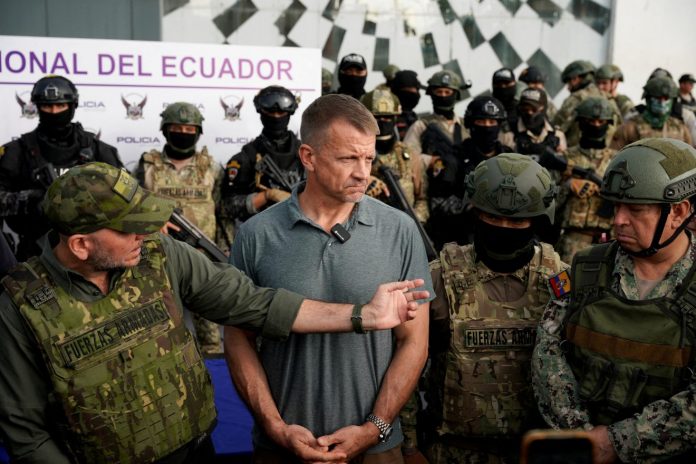Erik Prince, the controversial founder of Blackwater and longtime ally of Donald Trump, is mounting a major comeback. He has secured a new deal to “protect” the Democratic Republic of Congo’s (DRC) lucrative mineral sector and is pitching a privatized prison complex in El Salvador that critics say echoes Guantanamo Bay.
In a letter dated Feb. 8, 2025, Congolese President Félix Tshisekedi proposed that, in exchange for U.S. military support to combat a rebel insurgency, the Democratic Republic of Congo would grant lucrative mining contracts to the United States. This proposal aligned with the Trump administration’s recent initiative to establish a sovereign wealth fund aimed at investing in strategic sectors, including critical minerals.”
Tshisekedi was simultaneously holding negotiations with Princ aimed at allowing his private firm to tax and “secure” the DRC’s mineral wealth. Reuters recently confirmed that a deal has been reached.
While the letter did not specify the type of military support Tshisekedi was seeking, the exchange on offer would open up Congolese reserves of cobalt, lithium, copper, and tantalum—critical components in high-tech manufacturing—to U.S. firms. The proposal aligned closely with Trump’s “Stargate” initiative, a $500 billion joint high-tech investment launched at the start of his new term.
On his podcast “Off Leash” earlier this year, Prince declared: “It’s time for us to just put the imperial hat back on, to say, we’re going to govern those countries.” He added, “You can say that about pretty much all of Africa; they’re incapable of governing themselves.”
A Legacy of Violence
Prince rose to prominence during the George W. Bush administration, when his firm Blackwater became a central part of U.S. military operations in Iraq. The company was so deeply embedded that it was sometimes called the private wing of the U.S. military. Blackwater was later implicated in a CIA assassination program.
But the firm’s reputation was irreparably damaged after the 2007 Nisour Square massacre, in which Blackwater personnel killed 17 Iraqi civilians. The incident stands as one of the grimmest examples of the Iraq War’s failures. A federal jury found several of the mercenaries guilty of murder in 2014. Trump pardoned them in 2020.
Through the Obama years, Prince faded from public view. Tainted by Blackwater’s legacy and the fallout from the Nisour Square massacre, he struggled to regain his former influence. But his alignment with Donald Trump and the Republican Party opened the door to a new round of ambitious proposals.
That resurgence was soon complicated by a fresh scandal. In 2021, Prince was accused of violating a United Nations arms embargo by aiding Libyan warlord Khalifa Haftar—a scandal that derailed his efforts to regain a foothold in Washington. A U.N. report alleges that Prince provided military support to Haftar, including weapons, aircraft, and proposals for a mercenary operation known as “Project Opus.”
Despite the setback, Prince is forging ahead, emboldened by Trump’s return to power. A 26-page plan he pitched to the Trump team outlines a $25 billion private deportation force capable of deporting up to 600,000 people per month.
Another recently leaked proposal reveals Prince’s plans to build a mega-prison in El Salvador, partially under U.S. jurisdiction and shielded from legal oversight. Though framed as a tool for deporting undocumented immigrants, concerns grew after Trump was caught on a hot mic telling President Bukele, “The homegrowns are next.”
Around the same time, the Trump administration began instructing immigration officers to flag “antisemitic” social media content as grounds for denial or removal. Civil liberties groups warn that such policies are already being used to suppress pro-Palestinian speech. Taken together, Prince’s prison and Trump’s crackdown suggest a terrifying possibility: that political expression—particularly criticism of Israel—could land people in offshore detention.
Former Blackwater CEO Erik Prince wants US taxpayers to fund privately run deportation camps in El Salvador.
No legal challenges, no due process, no accountability.
Hiring private companies is a key way the US evades oversight and accountability for human rights abuses. pic.twitter.com/BBuDKrkp36
— CODEPINK (@codepink) April 18, 2025
Human rights groups have already raised concerns about potential violence, overcrowding, and abuse at the proposed facility. The comparisons to Guantanamo Bay have sparked widespread alarm online, though no official announcement has indicated that the plan will move forward.
Meanwhile, the agreement with the DRC is already underway. Prince has previously voiced frustration that U.S. military intervention did not come sooner during the 1994 Rwandan genocide, when hundreds of thousands of Tutsis were massacred. That conflict ended with the fall of Rwanda’s Hutu-led government and the rise of President Paul Kagame, a Tutsi.
Now, as the Tutsi-led M23 rebel group advances across eastern Congo—a movement the United Nations accuses Rwanda of supporting—Prince finds himself profiting from a crisis rooted in the very conflict he once lamented.
Feature photo | Erik Prince meets with Ecuadorian President Daniel Noboa in Quito, Ecuador, on March 11, 2025. The image was shared on Noboa’s official X account. Daniel Noboa | X
Robert Inlakesh is a political analyst, journalist and documentary filmmaker currently based in London, UK. He has reported from and lived in the occupied Palestinian territories and hosts the show ‘Palestine Files’. Director of ‘Steal of the Century: Trump’s Palestine-Israel Catastrophe’. Follow him on Twitter @falasteen47
The post What Do Congo’s Minerals and a Shadowy Prison Deal Have in Common? Erik Prince appeared first on MintPress News.
